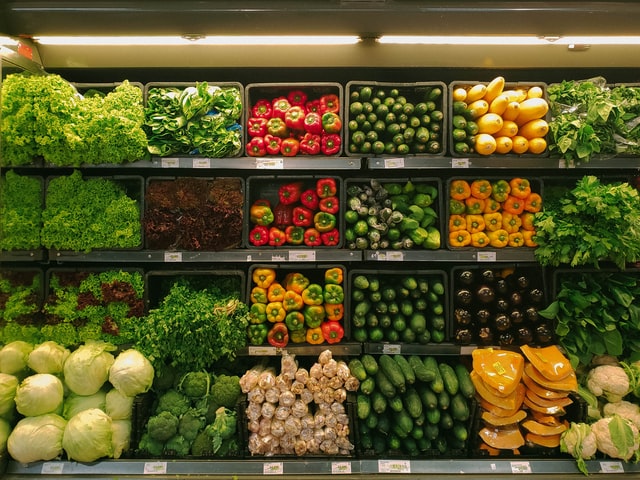36 Super Smart Ways to Save Money on Food & Groceries – Today!

All the top tips and expert ways to take back control and start to save money on food and groceries. Make the best budget plan and see the change fast.
- Make a list
Before you shop make a list, and stick to it in the store to avoid impulse buying items you don’t need. If a pen and notebook isn’t your thing, try and app like Out of Milk. - Meal planning
You’ll buy fewer unnecessary groceries each week, and cut down on waste. Decide before you go shopping what you’d like to eat that week, and then make your list accordingly. - Shop on a full stomach.
Shopping while hungry has been proven to make you buy more, because everything just looks so good! Eat before you shop to cut back on impulse shopping. If you forget to eat before you go, keep mints in your purse or your car and eat one while you shop. Your focus will be on the taste and smell of the mint instead of on all the other tempting smells in the store. - Shop only once a week
It’s easy to make a “quick trip” to the store for milk and eggs on the way home from work, but once you’re there, it’s also really easy for unnecessary items to make their way into your cart. Shop mindfully, and only when you need to.
Look in your cupboards before you shop, so you don’t end up spending unnecessary money on things you don’t need. - Make your food from scratch
As much as possible instead of buying prepackaged or ordering takeout. If you don’t know how to cook, ask a family member or friend to teach you, sign up for a class, or find a great YouTube tutorial. - Use apps
like Checkout51 to digitally collect weekly coupons for your purchases, which can be redeemed by snapping a picture of your receipt. - Shop when you have energy
When you’re tired or stressed, or making a trip on your way home from a long day, your focus may take a toll and your preoccupation may prevent you from making wise decisions. - Get familiar with your grocery store
Studies show that when you walk down more aisles, you’re more likely to spend more money, so by sticking only to the parts of the store you need, you’ll save yourself some cash. - Take Stock of your fridge and pantry
Clean your fridge and pantry once a month so you know what you have and use what you already have in the house. You might even find some items you’d completely forgotten about, so doing this often can stop that food from going to waste! - Price Comparing
Get an idea of prices at each supermarket. If you find that one had consistently lower prices on produce, while another charges less for eggs and butter, then shop accordingly. - Learn from your waste Keep an eye on what you throw out: moldy veggies, expired canned goods, etc. Every piece of wasted food is wasted money, so learn from your own mistakes to keep it from happening again.
- Stay away from prepackaged meals
Because they’re usually way more expensive than making your own. If you buy prepackaged individual servings because worry that you won’t eat an entire lasagna on your own, then pre-portion and freeze meals once you’ve made them. - Flipp Is a mobile app which sorts and organizes coupons and deals from weekly circulation ads by most grocery stores. All you have to do is input your city or zip code to start saving.
- Buy & Freeze
Freeze what you won’t use right away. Cut up vegetables into your desired size, freeze them on a baking sheet, and then put them in a Tupperware container or freezer-safe Ziploc bag until you’re ready to use them. Shredded cheese freezes really well, too. - Avoid individually packaged snacks — buy the big bag of pretzels or chips, and portion them yourself once you get home.
- Ibotta
Is a grocery shopping app that lets you get cash back rebates on specific purchases by uploading a quick photo of your receipt. The money you earn back is held by Ibotta until you’re ready to transfer it to your bank or PayPal account. - Find a budgeting system
That works for you, like the Envelope System, where you withdraw and set aside an amount of cash in an envelope designated specifically for groceries each week or month. - Supermarket’s sale section Often called the “Manager’s Specials”, these shelves or bins contain bruised produce, food that will soon expire, or other clearance goods. Discount produce can be cut up and frozen to expand its life span, and other foods in this discount bin can be purchased and used as needed for a great deal.
- Learn to love leftovers
Make dinner with the intention of eating lunch for leftovers the next day, or freeze leftovers so you have a quick and easy meal option next time you’re too tired to cook. - Make your own snacks
Like your morning breakfast muffin or crackers your kids eat after school. They’ll be much cheaper, and you’ll get the satisfaction of knowing you made them yourself with all known ingredients. - Buy generic
Half the time, the name brand item is made in the same facility as the store-brand one, so when you shell out for the more expensive option, all you’re paying for is the label. - Sales
Just because it’s on sale, doesn’t mean you should buy it. “Buy two, get one free” is only a good deal if you’re going to use it, not if it’s going to go to waste. - Weekly Adds
Actually look at that weekly ad that you get in the mail instead of chucking it immediately into the recycling bin. Look for deals on items you’ll use, and clip coupons from the paper or find them on websites like SmartSource or Save. - Shop fresh
Packaged foods are often marked up higher than fresh produce, so try and introduce fresh snacks like grapes or celery with peanut butter to your diet instead of relying on packaged goods like chips or sweets. - Learn to love ugly produce
Grocery stores tend to have a high standard for the produce they sell, because ugly fruits and veggies just don’t look as appealing as perfectly shaped ones. Companies like Imperfect Produce will send you boxes of fresh and delicious — albeit ugly — produce for super discounted rates. - Check out your local farmers’ market
Or join a local CSA. You’ll be supporting local farmers, eating fresh, local, and seasonal food, and you won’t pay the marked up prices you’ll find at the grocery store. - Start a garden
If you have a yard, or even a sunny window, look into starting a garden for herbs or veggies. It’s a fun project that’s inexpensive to start, and in the end you’ll have some fantastic and delicious food. - Share the contents of your fridge
National Consumer Panel will pay you to scan and share with them the food in your house so they can use the data for research and market analysis. You’ll earn points each time you share, and you can redeem those points for cash, household items, toys, and electronics. - Optimize your credit cards
As long as you’re able to pay off your balance each month, you should be using your credit card to earn rewards or points on your grocery purchases. Many cards offer special deals or cash back on groceries, so do a little research and see if you could be getting more from your card. - Look at last week’s grocery bill
Find the most expensive items. Try and look for cheaper alternatives for those expensive products, like swapping out ground beef and buying ground turkey instead, or making your own cleaning products instead of buying the expensive (and chemical-filled) ones at the store. - Sign up for rewards
Most major grocery stores offer rewards programs, which give you access to in-store savings and also help you earn points that you can put toward fuel or future purchases. - Shop by yourself
Because studies show that you’re more likely to make impulse buys if you bring the kids or your spouse along with you. - Look high and low on the shelves
Items that are placed right at eye level — where they are more easily seen — are often more expensive than the food that’s up high or on the bottom shelf. - Shop in season
You’ll save anywhere from 30%-50% by shopping for produce that’s currently in season, and while that might mean passing up on some of your favorite foods, it could also mean discovering some new and exciting ingredients. - Do some research
On your local grocery store to find out their sale cycle. Most supermarkets cycle their sales on an 8-10 week basis, so having an idea of when your products will next be on sale can help you buy enough to last to the next one, or know when to wait another week before buying. - Coupon Sites If you buy your groceries online, look for promo codes and coupons on sites like DealWiki for some amazing deals on food and delivery.











